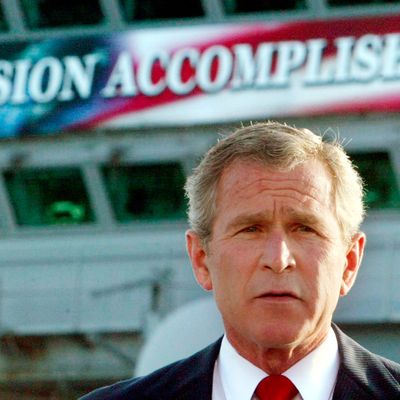
As America hurtles toward a potential Bush-versus-Clinton dynastic rematch, no Democratic loyalists have yet come forward to insist that Bill Clinton was in fact speaking the truth when he denied having sexual relations with that woman. There is, however, a continual submerged effort to deny that George W. Bush’s administration misled the country into the Iraq War. Today, The Wall Street Journal op-ed page has Republican judge Laurence Silberman fiercely insisting that the Bush administration did not lie, and that the claim it lied is itself a calumny.
Silberman’s argument is a simplistic one aimed at confusing those who have already forgotten the basic sequence of events. Silberman argues that a bipartisan commission, which he co-chaired, investigated the matter, and found that the Bush administration was victimized by faulty intelligence. “Our WMD commission ultimately determined that the intelligence community was ‘dead wrong’ about Saddam’s weapons,” concludes Silberman. So, yes, mistakes happen, but intelligence failures happen, and the Bush administration cannot be blamed for dishonesty.

Silberman does not mention that the commission he chaired did not even investigate whether the Bush administration manipulated intelligence. Senate Republicans refused to allow the commission to investigate this matter, fearing it would harm Bush’s reelection prospects. Indeed, Silberman himself wrote in the report at the time, “Our executive order did not direct us to deal with the use of intelligence by policymakers, and all of us were agreed that that was not part of our inquiry.”
This was a favorite line of pro-Bush spin. It is true that passing on faulty intelligence by mistake is not the same thing as misrepresenting intelligence. Bush’s defenders habitually rebutted accusations of the latter by insisting that the former was true. In reality, both things happened — the administration suffered from honest intelligence failures, and it misled the public about the facts as it understood them.
The question of whether, in addition to being victimized by faulty intelligence, also misrepresented the intelligence it did have, was left to a second Senate report, called the “Phase II” report, which came out a few years later. That report, which was endorsed by two of the committee’s seven Republicans and all its Democrats, concluded, “the Administration repeatedly presented intelligence as fact when in reality it was unsubstantiated, contradicted, or even non-existent.”
Incredibly, Silberman’s op-ed does not mention the Phase II report at all. Silberman simply asserts that his committee, which was specifically instructed not to investigate whether Bush manipulated intelligence, did not find that Bush manipulated intelligence, and presents this as the final word.
It is hard to believe that Silberman expects such a crude exercise in propaganda to actually succeed. His intention appears to be slightly more indirect: to turn the demonstrable fact that the Bush administration deliberately misled the public into, at the very least, a partisan dispute that journalists cannot repeat without fear of being accused of bias. Silberman shrewdly selects as his target Ron Fournier, the apotheosis of the journalistic ethos that the truth lies halfway between the competing claims of the two parties at any given moment.
Silberman uses the occasion of Fournier repeating the fact that Bush lied about Iraq as a fact to admonish him for bias. “In recent weeks, I have heard former Associated Press reporter Ron Fournier on Fox News twice asserting, quite offhandedly, that President George W. Bush “lied us into war in Iraq,” Silberman writes, “It is astonishing to see the ‘Bush lied’ allegation evolve from antiwar slogan to journalistic fact.” Silberman’s goal here seems to be to make it impossible for journalists to treat this particular fact as if it were a fact.






























